OP2.1 Sequence
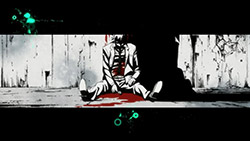 |
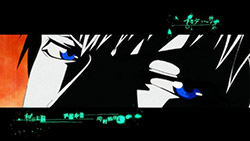 |
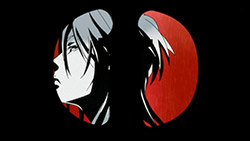 |
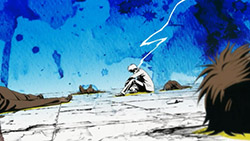 |
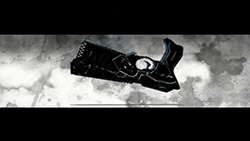 |
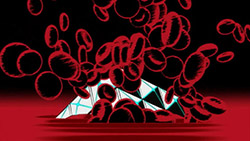 |
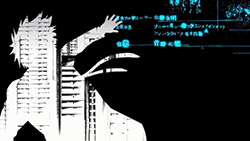 |
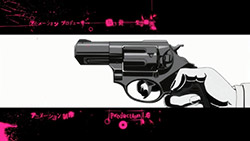 |
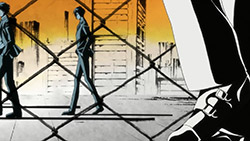 |
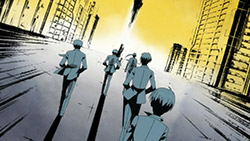 |
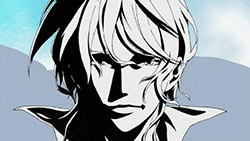 |
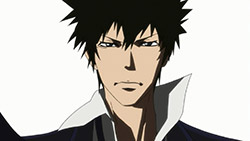 |
OP2: 「Out of Control」by Nothing’s Carved In Stone
 |
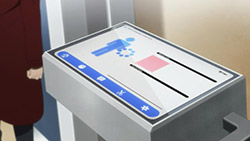 |
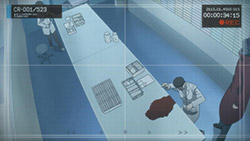 |
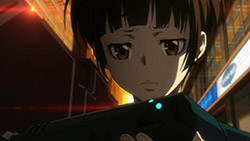 |
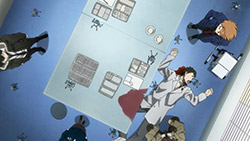 |
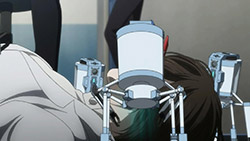 |
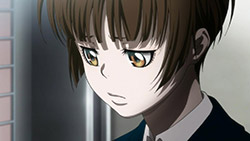 |
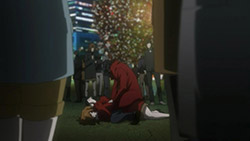 |
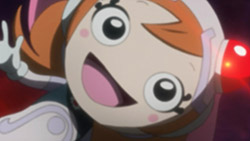 |
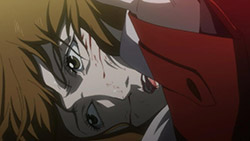 |
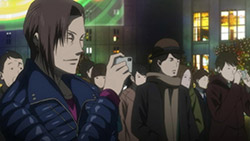 |
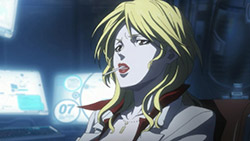 |
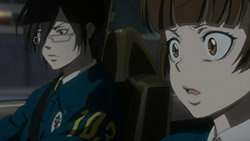 |
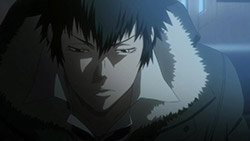 |
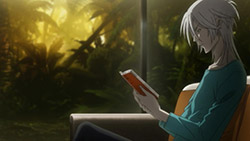 |
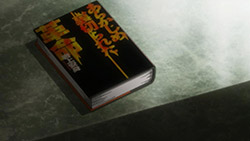 |
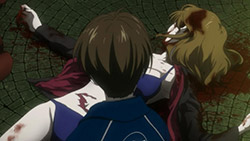 |
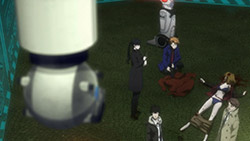 |
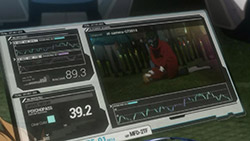 |
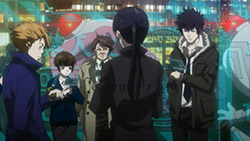 |
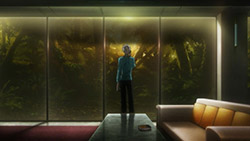 |
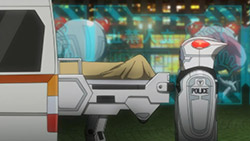 |
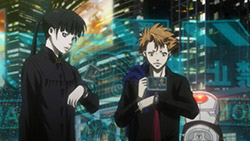 |
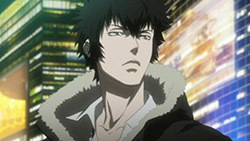 |
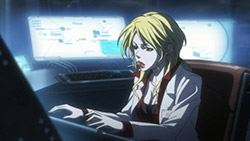 |
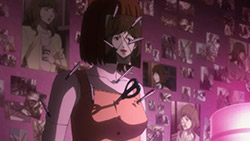 |
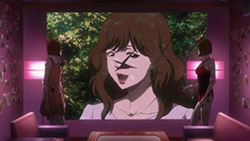 |
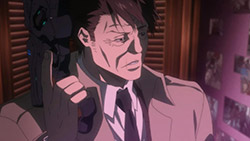 |
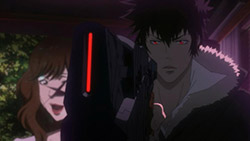 |
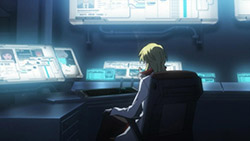 |
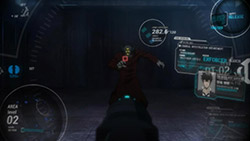 |
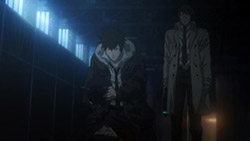 |
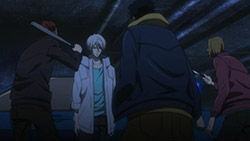 |
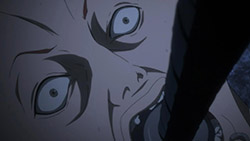 |
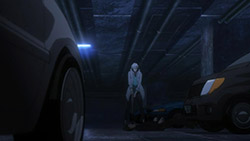 |
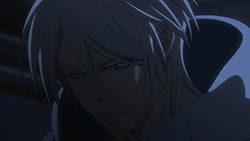 |
「甘い毒」 (Amai Doku)
“Sweet Poison”
After two somewhat middling episodes, PSYCHO-PASS returns with several bashes to the head to kick-start its second half. Extreme suffering and a penchant for violence is a staple in any Urobutcherbuchi Gen show, but their presence in PSYCHO-PASS strikes a different chord than their use in Mahou Shoujo Madoka Magica or Fate/Zero. In the latter two, those elements were merely devices, vehicles in which character development and emotional development saw light of day. The intense mental suffering of the girls in Madoka and the brutality in Fate/Zero were certainly heavy-handed and prominent, but neither felt like it was intrinsic to human nature. Despite the dark atmosphere of both shows, there was light at the end of the tunnel, and the messages at the end of the day were both poignant and somewhat uplifting – the sentiments of not being alone and even the most broken of men being able to find salvation are what tied the series together in a gratifying and hopeful way, even if the situations of the characters and the consequences of the plot were not entirely optimistic.
In PSYCHO-PASS however, everything is ascribed to being a part of human nature, especially the bad and the ugly. Urobuchi Gen is painting a highly disturbing picture of humanity that feels reminiscent of American author Flannery O’Connor. Her short stories tend to dredge up the ugliest parts of people that are uncomfortable to digest, but portrays a side of human beings that are startlingly accurate. Depicted as painfully flawed and riddled with hypocrisies, O’Connor’s version of humanity is pessimistic and offers no redemption to the characters involved.
Urobuchi’s portrayal of humanity seems just as pessimistic and irredeemable through the Sibyl system, the criminals, and even society as a whole. Humans have been reduced to either two categories: infantile beings that cannot be trusted to govern themselves, or brutal murderers who snap at the slightest loosening of their noose. The implication seems to be that the potential for evil present in every person is too great to overcome, a grave that humans dug for themselves with Sibyl’s suffocating capabilities. Society has lost all sense of morals as the murder of Fujii Hiroko so aptly demonstrates – actually, perhaps “lost” isn’t an accurate description. One cannot lose something they never had.
The murder of Fujii Hiroko is not only a reflection of the criminal himself, but the on-lookers. That’s where Urobuchi’s focus is: the lack of reaction, and the definition of “crime”. The word has an entry in the dictionary, but what does it truly mean? If there are no people who can clearly define a criminal act and ascribe connotation to it, what kind of impact does it have? Why is it necessary to apprehend criminals if no one can explain what crime was committed? Humanity has always lacked empathy in crucial moments, and on-lookers doing nothing to help victims when they are being raped/killed is nothing new. It’s nearly impossible to rationalize such behavior and some people would argue that’s a crime in itself. But it’s a part of human nature that has always been present and as difficult as it is to fathom, Urobuchi has captured human apathy at its best.
Applying this to the context of PSYCHO-PASS’s dystopia however, the lack of reaction brings into question whether or not having a “clear” psycho-pass is really a good thing. Makishima and even Akane are prime examples of this – both of them present compelling evidence of the confounding nature of psycho-passes and the nonsense in building an entire society based on it. Makishima should be a self-explanatory case of why the system doesn’t work. He could be an anomaly, but at the same time, he can’t be. By Sibyl’s definition, Makishima Shougo is the perfect human being – able to keep his composure no matter what the situation is, possessing such a strong mentality that he can maintain a crystal clear psycho-pass and a startlingly low crime coefficient even as he commits atrocities. What he has is complete apathy, which is ironically the trait Sibyl demands in order to run its society. Akane’s case is a little harder to understand as she’s so far depicted as the most compassionate and emotional character on the show. But she feels far from human, largely because her rebounding psycho-pass seems so abnormal. It’s construed as a positive thing but that is only in eyes of Sibyl’s idea of perfection, an idea that’s been firmly established as flawed and “wrong”. It implies that while Akane goes through the typical motions of human emotion, she does not truly “feel” them. At the core, she’s cut from the same cloth as Makishima, which is the only way one can be viewed as “ideal” in PSYCHO-PASS’s society.
Considering how warped the show’s world is, it’s no surprise the medium with which Makishima tries to force it out of its catatonic state is violence. It’s an effective tool for several reasons – not only does it challenge the foundation of the current society’s rules, it is also a “freedom” of sorts. Violence liberates humans from the shackles of conscience and the inhibition of societal values. Crimes are one of the things society has always strove to maintain a strict value of, enforcing a code of morals that became more and more restricting over the course of history. But before these set of laws existed unprecedented freedom which included allowing a person to act on whatever impulse their emotions dictated. Hence it can be assumed committing a crime effectively frees a person from worldly restrictions, returning them to a state of ultimate liberty. Of course there’s very little to separate humans from beasts at this point, but in Makishima’s eyes humans have already given up the characteristics that distinguish them from mere animals by choosing to forfeit their right to reason and logic for themselves. They have become mere sheep and aren’t sheep beasts as well?
Another notable thing about the violence in PSYCHO-PASS is the fact it is almost always committed against women, especially the more graphic acts. Perhaps it is intentional, or perhaps it is an unconscious indication of a maternal relationship gone wrong; whatever the case it’s not a comfortable scene to watch and creates an atmosphere not commonly seen in anime. In fact the tone and mood of PSYCHO-PASS closely resembles western crime procedural shows, in particular Criminal Minds. Not only are the subject matters somewhat similar, the depiction of graphic brutality mirror one another – scenes are uncomfortable to watch, but because they’re so unadulterated and raw, the gravity of the situation cannot be missed.
Some of the elements in PSYCHO-PASS still feels rough and unpolished, and the bridging of the gaps between anime and western styles can definitely use some work. But this isn’t a bad direction to be taking anime in, and with some care perhaps one day Urobuchi will be able to create the same sort of thematically challenging work with the stylistic flair of western prime time shows.
Random Corner:
- Let’s play Spot That Symbolism, shall we? I counted seven.
- Guess Production I.G put their decent animation team to work again – Akane actually looks decent in some of the close-ups.
Note:
We’re still in the process of deciding who’ll pick up PSYCHO-PASS. I filled in for this – err, last week since I was capping it already. So this post isn’t indicative of the writer you guys will be getting for the remainder of the series.
Full-length images: 1, 4, 5, 9, 11, 13, 15, 16, 17, 18, 20, 24, 28, OP 9, OP 10.
ED2.51 Sequence
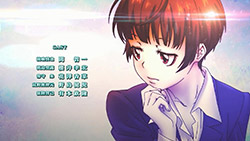 |
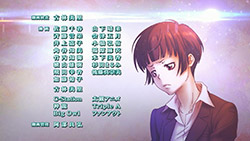 |
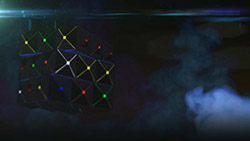 |
ED2: 「All Alone With You」by EGOIST

Yay nice post as usual.
Psycho-Pass – 14a
Psycho-Pass – 14b
Psycho-Pass – 14c
Psycho-Pass – 14d
Thanks for picking up PSYCHO-PASS.
And yet another way of circumnavigating the system appears…
Makishima might be brutal murderer, but (le gasp!) his actions may have (should the semi-optimistuc side of Urobuchi yet show) the effect of bringing down the system and humanity regaining it’s morality along with freedom. It is not because they were evil, the onlookers stood idle, it is because they could not comprehend what is happening. People brought up in violence-less society can’t defend themselves when it shows up suddenly. In a similar vein,I remember my first reaction to 9/11 radio news was – what a great enaction of newest Tom Clancy novel, way to go!
Watching the scene with the murder/rape, it reminded me strongly of the “Bystander effect”.
http://en.wikipedia.org/wiki/Bystander_effect
The presence of others makes it actually that much more difficult to offer help in such situations. Not that i wasn’t yelling at the monitor during this scene.
Like the sad, sad case of Kitty Genovese, who was murdered in the middle of an apartment courtyard with over 100 people watching. Diffusion of responsibility sometimes leads to no responsibility at all in humans, sadly
Although diffusion of responsibility definitely exists and is relevant to the discussion here, the actual circumstances of the murder of Kitty Genovese were wildly exaggerated (mostly by a sensationalist New York Times article at the time). Nonetheless, the incident is widely taught in Intro classes, since it was a major catalyst which spurred research on the subject.
For the curious, here’s a paper with more on the murder and the idea:
http://www.grignoux.be/dossiers/288/pdf/manning_et_alii.pdf
I heard something similar happened to someone Urobuchi knew from Nitro Plus, don’t know if it’s true though.
I do remember reading about their music producer getting killed, though I don’t think anyone have actually seen it. Maybe you mean a different person altogether.
Here’s the link about the news on the killing of the Nitro+ staff: http://myanimelist.net/forum/?topicid=451019&show=0
he was kill in the street and nobody help him! World become scary place now
A stabbing case where the assailant remained silent throughout actually happened in Osaka last year: http://www.yomiuri.co.jp/dy/national/T120611004119.htm
I was genuinely terrified watching this episode. I briefly considered stopping it and continuing at a later time, but figure it’s easier to just go through it once (then follow up with happier shows). I’m pretty sure the rest of the series will continue to cloud up my psycho-pass, if this episode was any indication. I could barely watch the scene on the street…
Agree, this ep was intense.
Agreed. That was a gut-wrenching scene to watch, in much the same way I found the scene in FZ to be, wherein Kariya strangled Aoi Tohsaka. The lack of background music and minimalization of cutaways besides to the blank-faced onlookers made it feel all too real.
Lots of excellent, compelling material in this ep. Glad we’re back to full steam, even though the “lower tier” eps. were interesting in their own way.
A few parting notes: Did anyone else find it darkly hilarious that Shinya essentially got to shoot himself when tacking down that fleeing criminal and deducing how the helmets functioned? I thought it was too clever and funny by half.
The way Makishima dispatched his three would-be attackers was chilling enough in how easy and methodical it was, but the part with the bat reminded me of a scene in American History X, where a man is made to bite down on the cement lip of a sidewalk and then his attacker stomped on the back of his skull.
As much nightmare fuel and brutality has Psycho-Pass showcases, I am still draw to it for its amazing complexity in themes, moral dissections, and societal commentary.
It’s funny that the circumvention of the psycho-pass hue readers could easily be dealt with if the NON-LETHAL shots from the Dominators could be ‘fire at will’. If they’re not lethal, it really doesn’t hurt (too much) to give Enforcers/Investigators free reign over who they choose to shoot. But, of course, that would nullify much of the plot’s tension… and we can’t have that so… common sense out the window…
There’s the China incident where a baby was ran over repeatedly in the middle of the road while the drivers and bystanders did nothing. The baby died later.
BAKACHI = UFCW(Unlimited Full Capture work)
BTW Bakachi, ARE YOU DISTRESSED?
That was definitely the best part of the episode.
I love the new opening animation. The song, well, it’s catchy, but Nothing is Carved in Stone has the grammar of an infant.
i miss verdant already.
I am sure asd is simply giving his regards to Verdant and lamenting his departure and nothing else.
How you downvoters managed to interpret this as a slight on Bakamochi is simply baffling to say the least.
Leave the doubting and second guessing of one’s intentions and assuming the worst in fellow humans to fictional writers like Urobuchi, please.
Not only the same 8 idiots decided to doubt asd’s intention, they have also downvoted my post not because they disagreed with me, but they knew that I have spoken the truth and are butthurt about it.
You’re not alone on that one.
we miss him because we like him but, this don’t mean that we hate bakamochi post either , we acually enjoy it!
no i really meant that i liked verdant’s posts better.
I was very scared with mob psychology that people are callous with the horrible situation and even enjoy about the crime… What a lamentable… I saw people’s mind is getting infertile and that is one of the reasons why this contradicted device is destructive
Change “Some” into “Most” and remove “the…of western prime time shows” in the last paragraph and that’s how I feel about this show.
CAUSE I FEEEEEEEEEEEEEEL.
probably one of the most singable OPs this season.
That and the JoJo OPs.
Pretty typical how the first reaction people had when they saw something horrific happen was to pull out their cellphones and film it. That’s not futuristic, that already happens right now. Kinda funny, really.
Also, I kind of got Joker vibes from that first scene.
“I’m going to make these scissors disappear! Tadaaa! And now it’s gone…”
Sans the Sibyl system and the dominators P-P is pretty much a mirror to real life.
Well, we now know why the Dominator didn’t do anything in the beginning scene of Episode one, as the guy who was trying to dice up Kogami was wearing one those fancy lil’ helmets and was sponging of Makishima’s Psycho Pass.
Hmm, must admit Makishima’s actions are reminding me of V for Vendetta (a twisted version though), in which he’s trying to lead people to “The Land of Do-As-You-Please” but of course, again like V for Vendetta, first comes Anarchy before you reach the promised “Land” but I think anarchy would’ve been a preference to that scene in this episode.
Just watching as no one did anything to save that woman, and that robot just hovering, smiling while giving advice…. ugh >.<
You beat me to it, Digid.
Seeing the scene again, Kougami realizes that as well upon seeing the trigger not working, and goes into a fistfight with the guy, eventually smashing the guy’s mask as Kougami tossed him out of the window, allowing the Dominator to blow him to bits.
Makishima could easily have an entire army of masked psychopaths even if the Bureau had the city evacuated to prevent them from sponging the good citizens’ Psycho-Passes, as his own naturally immune PP is more than enough to supply them.
Now the OP2 animation is awesome.
I thought the previous monochrome treatment of clips from previous episodes was a bit dull compared to OP1. And seeing ED2 get another treatment, guess it’s safe to guess that Production IG didn’t finish drawing the animations for both OP2 and ED2 in time for episode 12.
Anyone want to analyze some of the shots in the OP2 sequence? With Kougami and Akane pointing their guns towards Makishima, though Akane stays with the Dominator, whereas Kougami uses a more “old-fashioned” revolver, hinting at an unorthodox solution where Sybil is not involved, as the society built around the Sybil System crumbles under Makishima’s machinations.
The Dominator falling and the use of the revolver were the two biggest/obvious symbols I could see. There was the Rubix cube falling into the pool of blood that’s pretty significant, too. Taking the cube as a substitute for an ordered society, it sinking into blood could represent a coming of chaos or humanity falling even further into the depths of darkness (i.e. crime, anarchy, etc.).
Kougami is also a pretty prominent image in the OP as well – he’s always seen by himself surrounded by dead bodies or walking away from his companions. Not only is that a pretty heavy-handed indication of the Destiny Only the Main Character Can Fulfill, it brings into question the fates of the rest of the Enforcers/Inspector. I personally don’t see the lot of them surviving, but who knows.
One last important piece of imagery that strongly hints at Makishima’s fate is the book he was reading – “A Revolution Sabotaged Before It Began”, according to the subs. Pretty self-explanatory, really.
Since he does not believe in the Sybil System and is even in fact out to destroy it, Makishima is certainly wise to develop some martial arts skills to protect himself as the system begins to crumble and unable to protect the society as it was designed to.
This is not unlike Kougami, who probably has his own doubts on the system ever since Sasayama’s death, and no longer relies solely on the Dominator.
Conclusion, fistfight between Makishima and Kougami inevitable.
Wasn’t it mentioned by Akane’s voiceover in the first episode that “in hindsight, the clash between those two was inevitable”?
As if Makishima really needed to be anymore badass, the ending to this episode is like icing on the ‘villain’ cake.
What’s weighing on my mind most after this episode is the conversation Makishima had over the phone. While I’m hoping it wasn’t just Choe Gu-Song, that then leaves the question of who and to what purpose they will serve in the grand scheme of things, especially if they’re affiliated with Makishima.
Okay lets see if I got this right
Inspectors = Shepherds
Enforcers = Hounds
Criminals = Wolves
Average Citizen = Mindless Sheep
So that means Makishima = Wolf in Sheep’s clothing?
You pretty much hit the nail on the head.
https://randomc.net/2010/09/09/ookami-san-to-shichinin-no-nakama-tachi-11/
White being used as the color of evil has been a trend on the rise these days, ever since Eva.
Baten Kaitos, Ookami-san, Tales of Symphonia come to mind.
With black being the color of the good guys, Chunibyou style. Bleach, SAO, Darker Than Black, Black Lagoon etc.
http://tvtropes.org/pmwiki/pmwiki.php/LightIsNotGood/AnimeAndManga
Katekyoushi Hitman Reborn!
good post.
i don’t agree with you on some things:
– i think Akane DOES fell things, she just bounces back/ she’s strong;
– oh god i don’t want MORE western (american) cop shows, there is enough of them already most of them feel like each other and are really black and white – good guy vs bad guy. So no to anime becoming more like western cop shows.
“One cannot lose something they never had.” – love that sentence
Totally agree, we don’t need it to turn into episodic western cop shows .. IMO because they are done-to-death and in fact are inferior to shows like this .. this show is already far ahead of western cop shows and in fact it is more Sci-Fi and cyber-punk than it is a cop-show, the Sci-Fi elements are used for social commentary and analysis of the human psyche while also giving us a hint at a possible future that humanity might tread .. not to mention has an overarching plot and theme that ties everything together … that’s far ahead of the overly forumlatic/episodic western cop shows which rarely (if ever) have an overarching singular theme or plot.
It’s kinda baffling that someone considers this show inferior to the episodic western cop shows XD
I never said it was inferior to western cop shows, for the record. I said the atmosphere was similar to some of the darker shows, but never once did I outright call PSYCHO-PASS a “western cop show”.
Done to death they may be, but they do have a stylistic feel that’s lacking in Asian media in general. Not to mention western dramas are built to have an episodic format so the flow from episode to episode is a lot smoother than something like PSYCHO-PASS where it has an overarching plot that’s told through individual cases. The overall theme in P-P is clear and delivered well, but the transition from individual episodes is a tad rough.
I dunno, episodic shows couldn’t hurt. Look at Ghost in the Shell (where Psycho-Pass obviously takes influence from), which had half of each season be about stand-alone episodes that were just small interesting stories that helped to expand the setting, the characters and the lore. These are all things that Psycho-Pass needs pretty badly.
Also something different from Urobuchi in this series: Only one “good” character has died and it was a supporting character.
Definitely one of the finest episodes so far, not only does it explain the scene from the prologue (the flash-forward scene in the tower building) in which Kogami fights a guy with a helmet which was immune to Dominators and eventually cracks his helmet and kills him (then Shogo shows up .. and now we know that guys helmet was probably copying Shogo’s PP at the time) but it also elaborates that while Sybil has flaws (like any other system) it was in fact doing a great job (the job it was made for) which is preventing crimes before they happen and lowering crime rates significantly .. it seems to was too good at that to the point the society became sanitized to criminal acts and didn’t recognize a crime happening in front of them.
And in a way that’s the price humans had to pay to get extremely low crime rates via Sybil .. they became sort-of-numb and sanitized, their instincts dulled and their awareness lowered .. many people would actually be okay with paying that price to live peacefully (majority of population) .. other people don’t like that and want to change things (like Shogo Makshima, who believes life isn’t worth living that in that sanitized way) .. but if you look at the bigger picture you will see that in fact this is what has been happening to humans ever since the dawn of history .. cavemen probably had sharper instincts, far better awareness and were far more nimble and stronger than the average human today .. but life was extremely harsh and dangerous .. the price humanity paid for the luxurious life most of us live to today is the same price the people in the future will pay to get their safe lives .. but how far will this go !!!? .. and will we even be recognizable as humans if we go further down that road (sacrificing our instincts and awareness for safety) .. just some food for thought.
There were hints at that before but this episode elaborated on it beautifully and in detail and started the final act of the show that will lead us to the first scene in ep1.
Before i end my comment i have to say the scene with the woman getting beaten to death in public was already quite disturbing by itself (specially knowing it did happen few times in real life .. check the ‘Bystander-Effect’ on Google” .. what made the scene far more creepy, unsettling and discomforting (and borderline black comedy at the same time) is the robot with the cute face addressing the woman being beaten to death and telling her she needs help and that she is distressed .. simply brilliant.
@Da5id
Sorry, i meant this as a comment on the episode not a reply for you XD
What i was trying to tell you is .. don’t tempt Urobuchi .. he is already hinting at something coming .. check the first screen-cap in this post (the one from the OP).
http://en.wikipedia.org/wiki/The_Better_Angels_of_Our_Nature
“The Better Angels of Our Nature: Why Violence Has Declined” argues that violence in society and around the world has been going into decline for a long time. Not because of the result of any biological changes in our part, but because of external forces/pressures that forces humans to adapt and become more peaceful for their own (selfish?) interest.
Yeah, but even if they killed everyone off in the last few episodes, it wouldn’t be nearly the rate as in Madoka or Fate/Zero.
selfish would be a too strong word, perhaps a better one would be an invested self interest to promote/maintain peace and security for their own investment and protection.
BakaMochi, please consider continuing writing for the rest of the Psycho Pass series!! Loved your take on this episode!!
Another notable thing about the violence in PSYCHO-PASS is the fact it is almost always committed against women, especially the more graphic acts. Perhaps it is intentional, or perhaps it is an unconscious indication of a maternal relationship gone wrong; whatever the case it’s not a comfortable scene to watch and creates an atmosphere not commonly seen in anime. In fact the tone and mood of PSYCHO-PASS closely resembles western crime procedural shows, in particular Criminal Minds. Not only are the subject matters somewhat similar, the depiction of graphic brutality mirror one another – scenes are uncomfortable to watch, but because they’re so unadulterated and raw, the gravity of the situation cannot be missed.
It’s a common trick among horror genre writers, since the society we live in tends to view cruelty towards women to be worse than towards men, horror genre writers use it to make scenes like this more horrifying and disturbing.
The Bystander Effect is a very real and disturbing phenomena. I already read about it before, but to see it animated in context is still difficult to watch. This nihilistic social commentary is very much Urobuchi, spitting on altruism with a dose of reality. Never change Gen, never change.
Makishima is trying to bring down the system isn’t really surprising. The public sightings are just means t to shake the foundations with little steps. Question will be how for can he go until the our protagonists can reach him.
https://randomc.net/2013/01/29/psycho-pass-14/comment-page-1/#comment-927900
I also felt while watching this week’s ep that it was like watching a crime procedural because of the emphasis on the squad and on what was happening, versus a flashback or character study as in prior weeks. But Psycho Pass definitely compares favorably to that type of conventional TV series. I tried to watch The Following and it seemed really dumb and bush-league compared to Psycho Pass. Especially when a character wrote “Nevermore” in blood on the wall.
There might be a lot of violence against women here, although I hadn’t found it gratuitously so, but Kougami makes up for it by being in the hospital all the time, a standard melodramatic trope used to create empathy for the wounded male character and to empower his female partner.
Wow… I never noticed that the victims in Psycho-Pass were only women.
because men is replaceable and nobody is going to care if 1-10 million of them die for so-called peace in the war that somehow men created it!
this isn’t the dark ages, you know, women are just as responsible for creating current wars as well as dying for peace.
chill out guys got ironic comment i’m a man too
The moment I’ve been waiting for is here. The revolution begins and Makishima is as determined as ever. Awesome stuff.
Verdant is no longer here ! NOOOOOOOOOO! Thank you for picking this serie
Points noted: 1) if embracing the darker side of humans will give true liberation by committing crimes, then there should be a line for co-existence (with other people), deliverance from evil, and a limitation to the act. But that line (as a limit) is not to differentiate humans from beasts, it is between humans from themselves; 2) lack of reaction doesn’t mean no reaction but they both show apathetic response at a different level; 3) The causes of apathy are fear and/or ignorance; 4) It’s true that not being able to comprehend the situation will result in unexpected reactions, in this case, people are just watching the act of crime and not doing the just response. Plus, these people in Psycho-pass are so desensitized from no exposure to danger that it’s hard for any of them to function in the time of crisis.
P.S. I spot Makishima’s lackey, Choe Gu-Sung there https://randomc.net/image/PSYCHO-PASS/PSYCHO-PASS%20-%2014%20-%20Large%2011.jpg
Wow, you brought up Flannery O’Conner. I read one of her short stories in college, it was incredibly dark.
Fantastic analysis of this episode, I really enjoyed it.
Anyway, this episode of Psycho-Pass definitely highlights the worst of humanity and it being coupled with Sibyl just sent chills down my spine. The bystander effect definitely happens today but in a society where people are raised to automatically trust others, just wow. The final half of this series is going to be something to see, that’s for sure.
Thank you! 😀
I had to read like three of her works way back when… it put the entire class in a foul mood LOL. While I can confidently name her as one of my favorite authors, her short stories are really something. It’s just… everything about humanity you didn’t want to know. Which one did you read?
the reference seem to me to be so varied and actually up to the audience ( unlike zetsuen no tempest that just steals plot elements from shakespeare and uses quotes to sound deep and dramatic at times so randomly) this is what i like the most about this show some things are abvious and so much more is free play. also the new episode has just proven that the distiction victim/agressor in the last insidents is not so clear as the helmet users are themselves ( and convincingly) victims too
and psycho pass is SO MUCH BETTER THAN CRIMINAL MINDS!